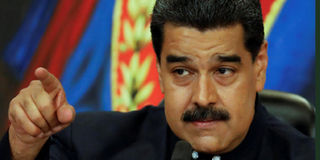Venezuelan president eyes wins in local votes

What you need to know:
The main opposition parties are boycotting the vote, saying they lack any guarantees of fairness or transparency as voters pick 335 mayors across the country.
Caracas, Venezuela | AFP |Venezuela's President Nicolas Maduro is expecting few surprises in Sunday's municipal elections, amid an opposition boycott and voter enthusiasm undercut by economic crisis.
The main opposition parties are boycotting the vote, saying they lack any guarantees of fairness or transparency as voters pick 335 mayors across the country.
But the lack of a serious challenge to Maduro candidates has led to skepticism in the main cities of Caracas, Maracaibo and San Cristobal.
"I'm not going to vote because I don't believe in the transparency of the CNE (National Election Council)," said Nerver Huerta, a 38-year-old graphic designer in Caracas.
Maduro's ruling socialist party was handed a clear path to victory after the three main parties in the opposition coalition Democratic Union Roundtable (MUD) refused to participate, although smaller parties have decided to contest the election.
In the cards is a repeat of the electoral drubbing suffered by the opposition in October's regional elections, which they claim were fraudulent, analysts say.
Those supporting the government are a combination of ideological loyalists and pragmatists aware that their electronic Fatherland Card, courtesy of the government, could help them get access to scarce medicine or food. Opposition critics call it bald-faced social control.
"The president, despite everything, has helped me. I could not be ungrateful," said William Lugo, 65, as he managed the payment of Christmas bonuses that the government says benefits four million people.
"I will vote on Sunday, and if we have to re-elect him, I will be there," he said.
Yon Goicoechea is contesting the election against the wishes of his party because he says the opposition must "defend" the political space it occupies.
Goicoechea, who is running for mayor in a Caracas municipality, said the government "will try to steal the vote, but we will not give it away."
According to electoral expert Eugenio Martinez, the opposition would do well to hold on to even fifty percent of its 72 mayorships.
"The absence of the main opposition parties and the pressure of the Chavez machinery make it unfeasible for the opposition to maintain even half of the mayorships it controls," Martinez told AFP.
Key opposition leaders Maria Corina Machado and Henrique Capriles left the coalition when four of the five elected opposition governors in the regional elections were sworn in before Maduro's Constituent Assembly, which he formed in July to bypass the opposition-dominated parliament.
Any opposition mayors elected on Sunday will also have to accept to be sworn in before the Assembly.
"They are not elections, but adjudications," Machado told AFP, adding that voting would mean recognition for the Constituent Assembly and thus constitute a "betrayal" of the 125 people killed this year in four months of anti-government protests




